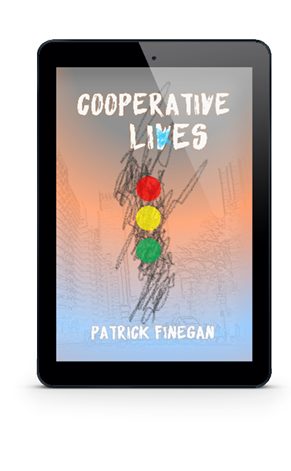Shelf Media hosts the annual Shelf Unbound Best Indie Book Competition for best self-published or independently published book. In addition to prizes, the winner, finalists, long-listed, and more than 100 notable books from the competition are featured in the December/January issue of Shelf Unbound.

A landmarked midtown Manhattan address. Carnegie Hall and Central Park at your feet. Three hundred units. Thirty-two full-time employees. Five hundred neighbors. You’ve hit the big time. Joined the elite. But what do you know about them, the neighbors? Have you ever met them? Really engaged with them? Or do you gaze down in the elevator, the same way you do on the subway and the street?
Oh sure, you’ve heard a famous writer lives on the fourteenth floor, a retired US senator on the eighteenth. You’ve witnessed so many Broadway impresarios glide through the lobby you’ve lost count. But what about your real neighbors – the couple in 7H, for instance, or the family in 8B? Did you know they once harbored the most wanted fugitive in America?
About The Author: Patrick Finegan
Patrick Finegan was born during the latter half of the Eisenhower Administration and graduated during the Carter and Reagan Administrations from Northwestern University and the University of Chicago Law School and Graduate School of Business. He worked more than thirty years in law, corporate finance, management consulting and risk management. He has a wife and grown daughter and has lived in the New York metropolitan area his entire professional life – most of that time in the same residential co-operative. Cooperative Lives is his first work of fiction.
Interview with Patrick Finegan.
Tell us about your book.
PF: Cooperative Lives is my first work of fiction, a novel about tenants in an upscale residential co-operative. Some old, some older, their lives come crashing together when one chance mishap triggers another, transforming their otherwise private residential complex into Ground Zero for a front-page national scandal. The setting is Manhattan, 2012-13, an island still recoiling from the financial crisis and still recovering from 9/11. The story predates WikiLeaks, Brexit, ISIS, the 2016 US presidential election and the global contagion of nationalism.
How did you go about developing this book?
PF: I began modestly. I envisioned a series of short stories depicting everyday occurrences of imagined neighbors in a staid Manhattan co-operative that would, when viewed collectively, present a pointillist impression of New York after 9/11 and the 2008 financial crisis. In one story, a compulsive planner locks himself out of his well-stocked apartment during a blackout. In another, a wife berates her husband for flouting pedestrian crosswalk signals in front of their impressionable child, only to be mowed down herself while observing them. In a third, an aging money manager accidentally depletes a client’s account, but is saved from ruin by a long-forsaken pack of cigarettes. Other stories entailed skiing accidents, medical malpractice, malware, overzealous media – a wide palette of seemingly unrelated topics.
What was the experience of writing this book like for you?
PF: Cathartic. I am a lawyer, not an actor and, until recently, not a novelist. My previous publications were professional. Writing fiction required immersing myself in an imagined character’s psyche, in their emotions, and then expressing them with the same fierceness and conviction as I feel my own. Then doing it again for the next character and so forth, each time with a nuanced or radically different perspective. Writing Cooperative Lives was a crash course in method acting, and I found it exhilarating. By extension, writing Cooperative Lives was an invitation to speculate. The two dowagers in the lobby, the one who always wears black and the other who never parts with her overcoat: why are they accoutered this morning in vibrant blue and red yet conversing so somberly? And why is the taller woman pointing insistently at the concierge? Previously, I wouldn’t have noticed. And probably shouldn’t have. But there is an undeniable vicarious thrill to speculating about other people’s lives, and writing a novel helped sate that appetite.
What writing advice do you have for other indie authors?
PF: That’s rich. A newbie offering advice seems preposterous. I suspect most indie authors have been writing fiction since college or their youth. Many have MFAs. I am a latecomer, well into retirement, with no formalized education in creative anything, except perhaps accounting. My advice to late bloomers is to begin by mining your own experiences – the trials you’ve witnessed firsthand, the memories you’ve suppressed but which still somehow torment you. Buried within those memories are characters yearning to be freed, beseeching you to voice their emotions through your words. They may even furnish you with a plot.
For younger authors, my advice is, “Live.” Nothing breathes life into narrative description better than life itself – its heartaches, its challenges, its unexpected rewards. That applies even if you’re writing fantasy. And if you can’t work from genuine, on-point experience, conduct research, lots of it, until you’re ready to pull off a con, because that, after all, is the point of fiction.
What are you working on next?
PF: I am wallowing in research but hope to commence writing another New York-centered novel this winter, publishing it before my sixty-fifth birthday. That’s just four-and-a-half years from now, scarcely enough time to get to know my characters. Depending on life’s commitments, my timetable may slip, but I am eager to get started. Several readers have entreated me to bring back characters from Cooperative Lives, but I will probably begin with a fresh slate. A lot depends on my research. The connecting medium will be water.
READ AN EXCERPT
The man and woman sat at the patient’s side for an hour. The man turned to the woman and said, “You haven’t had breakfast yet, have you?” She shook her head slowly. “I’ll buy you breakfast in Tahoe. I need to return Susan’s rental car and retrieve her clothes. Can you give me a lift?”
“You don’t … you don’t want to stay here with her?” Another selfish bastard, the woman thought. Any excuse whatsoever to get away. His shoulders slumped.
“If it made even the slightest difference to the outcome, Hanni, I would. I’m just trying to be practical. My understanding is she rented a Miata. I have to either return it and replace it with something more, well, practical, or impose on you for God knows how long. If I deal with the car now, I can return in a day and camp out here until she’s discharged.” Hanni was unconvinced.
Jack tried again. “Melissa and my sister Eleanor are flying in on Monday. I need a roomier car. A two-seater won’t do.” Hanni seemed dubious. At last Jack blurted out, “How’s this? I can’t drive a stick shift. I might as well have inherited an airplane.”
Hanni burst into laughter then shushed herself. Even she knew when to remain solemn. “So what you really want is for me to drive you to San Francisco in Susan’s car so you can pick out something a little boy can drive?”
Jack shrugged. “Something like that. Would you do that for me, please?”
Susan’s husband no longer seemed superior. He was a pathetic little boy in knickers. “Come on, Mario Andretti, let’s go. You drive the first leg, back to Tahoe. The SUV’s got automatic transmission.” She hesitated a moment, then added, “You can buy me dinner, too.”

Continue Reading…
Article originally Published in the December/January 2020 Issue “2019 Indie Best Award Winners”
